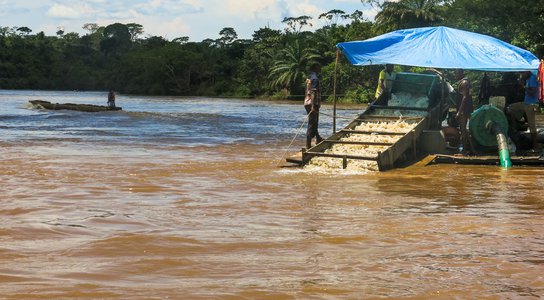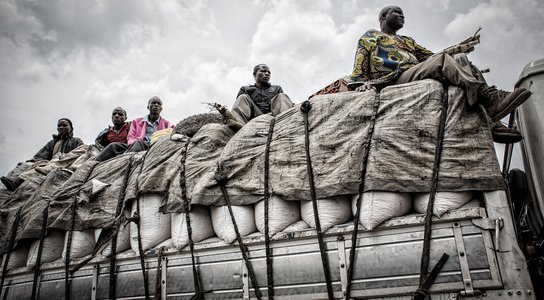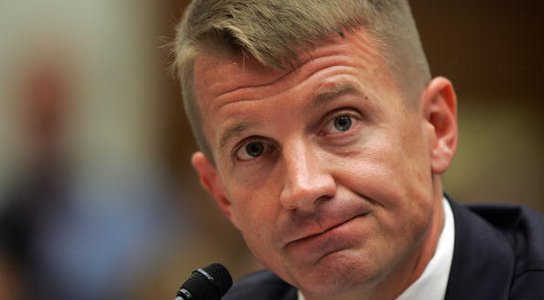A new company in Democratic Republic of Congo (DRC) appears to be a joint venture between the East Africa Region manager for Erik Prince’s Frontier Services Group (FSG), one of the former Congolese president’s alleged middlemen and an alleged gold smuggler. This represents an extraordinary coalescing of powerful interests in a single company at a time when DRC is grappling with its first peaceful transition of power in 60 years.
The company in question is called Congo Gold Raffinerie (CGR). According to a lawyer connected to the project, CGR will run a refinery in the eastern town of Bukavu on DRC’s border with Rwanda and not far from Burundi. Bukavu has long been a centre for both gold trading and gold smuggling.
CGR is owned by two companies that each branch off into different networks. One of these companies is Global Investment Congo (GIC), which has amongst its shareholders entities managed by an associate of former DRC President Joseph Kabila, Alain Wan, and a senior FSG manager Liu Zhigang. FSG is a security firm founded by US private security billionaire Erik Prince and the Chinese state is the largest shareholder. While FSG does not directly hold shares in CGR, Mr Zhigang is the sole manager of GIC, which is itself the largest shareholder of CGR and shared an address with the gold company, according to a 2017 mining licence.
CGR’s other shareholder is Marathon SARL, which is owned by Burundian-Belgian Karim Somji, once alleged to have smuggled gold, and Robert Mutesa, the managing partner of an airline that allegedly ran weapons during the Second Congo War. One of Marathon’s other listed owners is Joyce Otshimo Ekanga, a businessman who has shares in two DRC mining companies and runs a DRC-China chamber of commerce. He is the son of a powerful Congolese official Moïse Ekanga, a Kabila loyalist who oversees billions of dollars of Chinese investment in DRC via the government’s Office for Coordination and Monitoring of the Sino-Congolese Program (BCPSC).
“CGR is partly owned or run by an array of characters with track records that raise questions. This ranges from people that have been accused of smuggling DRC’s gold to a close associate of the former president to a senior manager in company founded by one of the world’s most notorious mercenaries,” said Jean-Luc Blakey, Senior Campaigner at Global Witness. “A business alliance between these characters should be looked at closely by anyone interested in transparency and the equitable distribution of Congo’s natural resource wealth,” Blakey added.
A gold refinery in DRC could be a means by which the country is able to exert greater control over the trade of its own resources, but only if the company operating it is transparent about its supply and exports. Historically, the Congolese people have not reaped the benefits of the country’s gold. For decades, the majority of its artisanal production has been smuggled across the country’s porous borders. Smuggled Congolese gold, often sourced in remote areas affected by conflict, is usually exported by neighbouring states to established refineries outside of the African Great Lakes region, where it is mixed into global supply chains. This vast illicit trade deprives DRC of millions of dollars of much needed tax revenue, while supporting corrupt officials and, at times, propping up rogue army units and violent armed groups.
In 2017, a huge gold refinery was opened in Uganda, run by a company called African Gold Refinery (AGR). Upon inauguration, AGR benefitted from substantial tax breaks granted by the Ugandan government. AGR was able to undercut smuggling networks, and provide Congolese vendors a better price for getting their gold to the global market.
It is possible that CGR is an attempt by powerful regional actors and investors to hoover up and profit from the Congolese gold that is currently being sold to refineries outside of the country’s borders, by refining it themselves. If this is the case, CGR will have to show they have robust due diligence in place for sourcing any gold they might process.
Regardless of CGR’s plans, it seems its paperwork is not currently in order. When Global Witness contacted a DRC government official to enquire about CGR’s processing licence, published online by the DRC Ministry of Mines, we were told it was invalid. CGR did not respond to any of Global Witness’s questions about the licence or its activities.
“There is a risk that CGR will be a ‘Raffinerie’ in name alone, using its title as a cover to legitimise exports of untraceable, semi-refined gold while getting tax breaks. If DRC’s people are to benefit from the country’s gold reserves, transparent investment and government oversight is required, not a company owned by opaque offshore entities, operating under a questionable licence,” said Blakey.
Global Witness has tried repeatedly to contact all the named directors and shareholders associated with CGR to learn more about the project. With the exception of a lawyer who was unable to answer any substantive questions, we received no response.
Global Witness is calling on the directors and shareholders of CGR to explain where they plan to source gold from, the validity of its processing licence, the intended scale of CGR’s refinery, where they plan to export gold to and what tax breaks, if any, CGR has been given.
/ ENDS
Contacts
Notes to editor:
Global Investment Congo (GIC) owned 60 percent of CGR upon incorporation, GIC itself was owned by Yeahong Investment (China/Seychelles) and Allamanda Trading (British Virgin Islands).
Yeahong Investment was incorporated in the Seychelles and run in 2019 by Liu Zhigang, the East Africa Region manager for Frontier Services Group (FSG). Prior to this, Liu Zhigang headed the DRC wing of a major Chinese conglomerate that won high profile construction contracts in DRC. Societe Zhengwei Technique Congo (SZTC), the DRC subsidiary of WIETC, reportedly undertook the refurbishment of Kinshasa’s Ndjili airport and in 2015 finished building L'immeuble de l'hôtel du Gouvernement de la République, which houses eight government ministries.
Allamanda Trading (BVI) has been represented at different times by Alain Wan or Jacques Meys. Wan is a reported close associate of Kabila and was on the board of a company that received millions in allegedly illegal payments from DRC’s central bank, according to an investigation by OCCRP. This money then “passed through the company only to end up in the pockets of a small group of President Joseph Kabila’s associates”.
Marathon Sarl owns 40 percent of CGR. Its owners and directors are listed as Karim Somji, Robert Mutesa, Joyce Otoshimo Ekanga, and Medard Palankoy.
Karim Somji, is a 59 year old Belgian national, born in Burundi and currently living in DRC. He is mentioned in a report on armed groups in DRC’s gold trade written by the Enough Project. The report alleges that in 2011 Karim smuggled gold from the Omate mine in DRC through Rwanda to Burundi, at a time when the site was controlled by armed groups.
Robert Mutesa was, according to his LinkedIn page, the managing partner of Planet Air during the Second Congo War (1998 to 2003). The airline, owned in 2002 by the wife of Ugandan General Salim Saleh, reportedly flew weapons from Uganda and Rwanda into eastern DRC during the conflict. In a report for the UN Security Council, UN investigators also accused the airline of facilitating the activities of the notorious arms smuggler Victor Bout.
Joyce Otshimo Ekanga is the deputy secretary-general of the Sino-Congolese Chamber of Commerce of Investment and Development. He is also a shareholder in two recently formed DRC mining companies, Nek Mining and Glorhis Multi-Services. His father, Moïse Ekanga, reportedly runs the DRC’s Office for Coordination and Monitoring of the Sino-Congolese Program (BCPSC), an opaque arm of the DRC state that manages business dealings and loans between DRC government and Chinese businesses. The Carter Centre discovered that, between 2008 and 2014, hundreds of millions of dollars of Chinese loans, overseen by the BCPSC under Moïse Ekanga’s stewardship, were not spent on infrastructure projects as intended. The BCPSC failed to account for the use of some $685 million in such loans.
Medard Palankoy – A shareholder of Marathon. Palankoy has been described in the media as Dan Gertler’s “go-to” lawyer in DRC and was a shareholder in a company sanctioned by the US Treasury Department when it targeted entities that had allowed Gertler “to access the international financial system and profit from corruption and misconduct”. Palankoy’s office address is the same as the registered address for CGR and Marathon.
You might also like
-
Report River of Gold
How the state lost out in an eastern Congo gold boom, while armed groups, a foreign mining company and provincial authorities pocketed millions
-
Report Time to Dig Deeper
New analysis shows companies exporting and trading minerals from the African Great Lakes region have made some progress on responsible sourcing, but must do more
-
Blog post Erik Prince in Myanmar – an own goal in the making for China’s Belt and Road investments?
Erik Prince's private security firm, backed by China’s state-owned Citic Group, is setting up shop in Myanmar, with local partners linked to the country's corrupt multi-billion dollar jade trade.